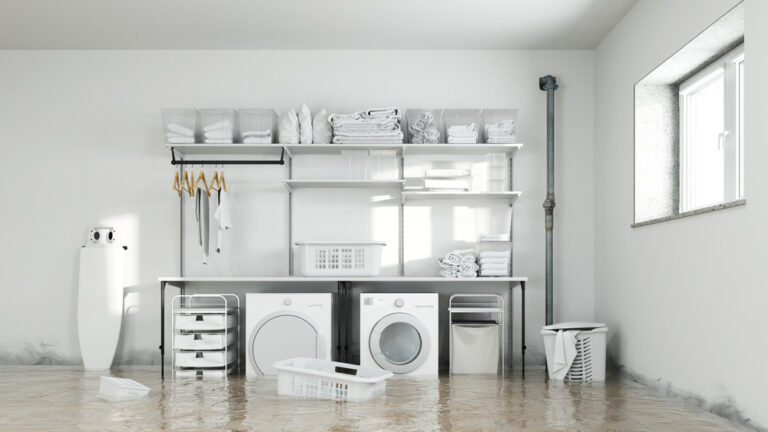
Dealing with a sewer backup is a nightmare that no homeowner wants to deal with.
Sewer backups can cause significant damage to your property and can be costly to repair.
Sewer backup insurance is a type of insurance policy that provides coverage for damage caused by sewer backups.
Considering sewer backup coverage is important to consider because it can prevent significant damage to homes and properties, avoiding costly repairs and restoration.
Sewer backup insurance covers the cost of repairs, replacement, and cleanup that are related to a sewer backup.
It also includes coverage for damage to your home and personal items, as well as cleanup costs.
Let’s take a look at the costs and risks of sewer backup insurance, as well as what causes sewer backups and how you can prevent them:
What is a Sewer Backup?
A sewer backup occurs when the water and waste materials that are supposed to flow out of a building through its sewer system become blocked and begin to flow back into the building instead.
This can be caused by a variety of factors, including clogged pipes, tree roots, heavy rainfall or flooding, or damage to the sewer system.
When a sewer backup occurs, it can cause significant damage to the building and its contents. It also poses potential health hazards due to harmful bacteria and other contaminants in the sewage.
In addition, the foul odor associated with a sewer backup can make the building uninhabitable until the problem is resolved.
If you experience a sewer backup, it’s important to take immediate action to minimize the damage and protect your health.
This may include contacting a professional cleaning service or plumber to address the issue, as well as notifying your insurance company to see if your policy covers the damage.
What Causes a Sewer Backup?
Sewer backups are caused by a blockage in the sewer line.
Blockages can be caused by tree roots, grease, or other debris that has accumulated over time.
Tree roots growing into the sewer line will eventually cause it to collapse and need to be replaced by a professional plumber who specializes in sewer repairs.
Sewer backups can also be caused by aging sewer systems, especially with pipes made of iron or clay that are more likely to crack.
You may also experience a sewer backup if there is heavy rain, a flood, or a clog in the municipal line.
How to Prevent Sewer Backups in Your Home
Sewer backups are a common problem in many parts of the country, but they don’t have to be.
If you know what causes them and how they happen, then you can take steps to prevent them from happening in your home.
Don’t Pour Grease Down the Drain
Grease can solidify and clog pipes, especially if allowed to sit for a long time.
Instead, pour grease into a metal container or can and dispose of it in the garbage once is solidifies.
Don’t Flush Anything but Toilet Paper and Human Waste Down the Toilet
Flushing sanitary products, baby wipes, and other items can cause backups in your home’s sewer system because they’re made with materials that don’t break down easily in water (and may even clog up your pipes).
Don’t Put Items Down the Sink or Garbage Disposal That Could Clog Drains
Things like stringy vegetables or dental floss tend to catch on blades inside these appliances and get stuck there until you remove them manually.
Avoid Sewer Backups During Heavy Rain
During a heavy rain storm, disconnect your downspouts, weeping tile, and foundation drains from the municipal drain, or add extensions to your downspouts, so the rainwater runs away from your house.
Find Out What Is Causing the Sewer Backups
To prevent sewer backups, you need to be aware of what causes them.
For example, a clogged pipe will cause water to back up into your house. If you have a sump pump, this may not be an issue because it can pump out excess water before it reaches your basement.
However, if you don’t have one installed or are relying on gravity alone (which is unlikely), then there’s nothing stopping sewage from pouring into your living space when one of these pipes becomes blocked.
What is Sewer Backup Insurance?
Sewer backup insurance is a type of add-on to your homeowners’ policy that covers the cost of repairs to your home and personal belongings caused by sewer backups.
If you live in an area prone to flooding or have experienced flooding in the past, it’s likely that sewer backup insurance would be beneficial for you.
Or, if your home has an aging sewer system or an older pipe, then you may be at risk of having sewage come up through your basement floor or into another part of your home.
Sewer backups can cause significant damage to your property and can be costly to repair.
Sewer backup insurance can help alleviate the financial burden of cleanup, often covering expenses such as:
- Replacing or repairing flooring, walls, ductwork, and damaged belongings.
- Decontaminating your home to remove bacteria like E. Coli.
- Temporarily relocated if your home becomes uninhabitable.
Because most people don’t have tens of thousands of dollars lying around to cover these expenses, sewer backup insurance is essential in at-risk areas.
Sewer backup insurance is an important part of home insurance for anyone who lives in an area where sewer backups are common.
You can protect your home and valuables from damage caused by sewer backups by purchasing a policy that covers these types of incidents.
How Much Does Sewer Backup Insurance Cost?

The cost of sewer backup insurance depends on your location, property size, and the amount of coverage you need.
In general, homeowners can expect to pay between $150 and $300 per year for this type of policy, but this all depends on where you live and the size of your home.
Those with larger homes may see higher premiums because they have more plumbing systems that could potentially be damaged by sewer backups or flooding events.
You can reduce the cost of sewer backup insurance by installing a sewer backup valve or backflow preventer.
These devices help prevent sewage from backing up through your plumbing and into your home.
Who Should Buy Sewer Backup Insurance?
Sewer backup insurance is affordable and can help you financially by covering the costs of repairs due to a sewer backup.
You should consider adding sewer backup insurance to your current policy if:
- You live in a low-lying area along a river that is prone to flooding.
- You live in an area with combined storm and sanitary sewers.
- Your area has severe weather.
- Your area is known for sewer backups.
- Your home’s elevation is low compared to sea level.
- Your neighborhood is dense in relation to the sewer line size.
How much coverage you need can depend on whether your basement is finished and whether you store valuable belongings there.
Speaking to an expert insurance broker can help you determine exactly how much coverage you need.
What Are the Risks of Sewer Backup Insurance?
While sewer backup insurance can provide coverage for damage caused by sewer backups, there are also some risks to consider.
For instance, not all sewer backup insurance policies are created equal, and some may have exclusions or limitations that could prevent you from getting the coverage you need.
In addition, it is important to note that not all incidents of sewer backups will be covered by insurance.
For example, the insurance company may deny the claim if the backup is caused by negligence or improper maintenance.
Another risk to consider is that even if you have sewer backup insurance, the damage caused by a backup can still be significant and may require extensive repairs and restoration.
In some cases, the cost of the damage may exceed the coverage provided by the insurance policy.
Frequently Asked Questions About Sewer Backup Insurance
Sewer backup insurance typically isn’t included in a standard homeowner’s insurance policy.
Homeowners or business owners may need to purchase a separate policy or add a sewer backup endorsement to their existing policy to be fully protected.
It’s always a good idea to speak with an insurance agent or broker to determine the specific coverage options available and what the policy covers and excludes.
In the meantime, here are some questions you may have about sewer backup insurance:
Are sewer backups covered under my homeowner’s insurance?
Sewer backups are typically not covered under a standard homeowner’s insurance policy. This coverage is usually offered as an add-on to your basic policy.
If you’re unsure whether your policy covers sewer backups, reach out to your insurance broker for more details on what’s included in your coverage.
Do I have to pay a deductible for sewer backup insurance?
Sewer backup insurance typically comes with a deductible, which is the cost you pay before the policy covers the rest.
A standard deductible for sewer backup insurance is $1,000, but you can choose to go higher if you want to lower your premiums and you feel confident you can cover more than that.
Do I need sewer backup insurance for my condo?
If you live in a condo, your condo insurance doesn’t automatically include sewer back insurance in your policy.
However, it may be covered under the building insurance you pay for through your condo fees, but typically it only covers a portion.
Check with your condo’s building insurance to see what the policy covers.
If you have renovated your condo, you may need to add a sewer backup endorsement to your policy to cover any upgrades.
Do I need sewer backup insurance as a tenant?
When you’re renting your home, tenant’s insurance will cover your personal belongings and living costs in the event of damage.
So it’s important to have sewer backup insurance to cover the cost of replacing your possessions and the costs of staying somewhere else while repairs are being done.
Your landlord’s insurance policy will cover the repairs and damage to the building but not damage to your valuables.
You Should Consider a Homeowners’ Policy That Includes Sewer Backup Coverage
This type of coverage is usually part of a homeowners insurance policy, but it’s important to know what your policy covers and how much it costs.
Now that you know the basics of sewer backup insurance, it’s time to make a decision. We hope we’ve made clear the benefits of this type of coverage and how much it costs.
If you’re still unsure whether this is worth considering, consider these questions:
Do you have an older home with plumbing that may be more susceptible to leaks?
Are there any other types of insurance coverage that could help protect against damage caused by sewer backups?
If so (and if not), we strongly recommend buying some sewer backup coverage before something happens!
Protect Your Home with Sewer Backup Insurance
Overall, it is important to carefully consider the cost and risks of sewer backup insurance before deciding whether to purchase a policy.
Speaking with an insurance agent is worth it to discuss your options and determine if sewer backup insurance fits your specific needs and circumstances.
At Capital Insurance Brokers, we focus on delivering a customized insurance policy designed to meet your unique needs.
From homeowner’s insurance and additional policies, we have you covered!
Contact us today to learn more about sewer backup insurance.

